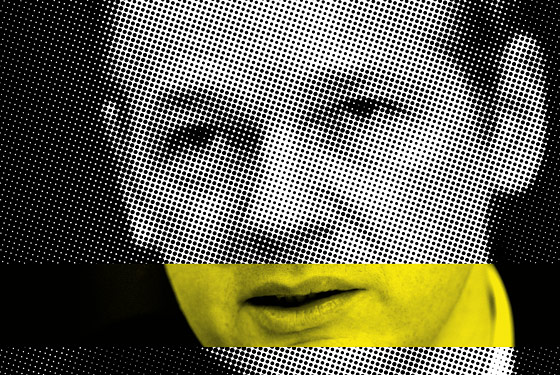Julian Assange, Media Mogul
The selling of Cablegate shows WikiLeaks learning how to keep its audience's attention.
 |
Illustration by Dienstelle 75 (Photo: Photoshot/Newscom) |
As we struggle with what to make of Julian Assange—watchdog? Menace? Both?—it's worth evaluating him as one thing he unquestionably is: a new-media entrepreneur. With WikiLeaks' dump of secret U.S. State Department cables, the U.S. government finds itself facing an organization not only willing to shred officialdom's veil of secrecy but committed to figuring out how best to distribute its scoops. The episode is playing out the way it is partly because of the strategy the group developed for sending those 250,000 documents into the world, complete with a custom Twitter hashtag.
For WikiLeaks, the Internet is a blessing and a curse. It's what makes it possible for the group to be a supranational leak collector and disseminator. At the same time, as a medium for news, the web is unfriendly to big, meaty stores of content. What Assange dreads is a repeat of November 2007, when his team published a cache of U.S. military records the world promptly ignored. "This was such a fucking fantastic leak: the Army's force structure of Afghanistan and Iraq, down to the last chair," Assange told The New Yorker. "And nothing." This October's release of 400,000 tactical reports from the Iraq War made a big splash but produced little ripple. And so we see Assange and WikiLeaks adjusting their approach in a bid to sustain interest.
Since its 2006 launch, WikiLeaks has experimented with ways to get traction, from auctioning documents to reporters to mulling a subscription service. But its content is determined by what's sent its way, which is why it's moved from discrete disclosures—Gitmo's operations manual, e-mails of climate-change scientists—to its "megaleaks" of documents allegedly pilfered by Army private Bradley Manning. Dealing with that sort of volume has demanded further adaptation. As WikiLeaks did with the Afghanistan and Iraq war logs, it prepped the diplomatic cables for maximum impact by co-opting old media, advancing documents to Der Spiegel, Le Monde, El País, and the Guardian (which passed them to the Times). But this time, Assange and his team diversified. Up went Cablegate.Wikileaks.org, a veritable Ikea of state secrets, with cables searchable by country of origin, topic, and security classification.
Just as important, WikiLeaks paired that site with a social-media campaign, imploring people to use Twitter, Reddit, plain old mail—"whatever suits your audience best"—to spread the conversation. Along with #cablegate, the group is encouraging hashtags named for individual cables, an especially savvy tactic. The overarching takeaway of Cablegate, that diplomats speak more frankly behind closed doors than in public, has a limited ability to change hearts and minds, but the cables become more compelling on a granular level.
The example WikiLeaks served up in its reader instructions—Cable #66BUENOSAIRES2481—tells of possible Argentine plans to unilaterally claim jurisdiction into the high seas over an area including the disputed Falkland Islands. That's news that might actually spark meaningful microdebate and eventual action. Meanwhile, WikiLeaks keeps the revelations coming, doling out another 200, or twenty, cables every day. In blogspeak, that's called feeding the beast.
Last week, WikiLeaks.org was booted from Amazon's cloud servers and knocked out of service two other times. But the site was still accessible through a Swiss server and will surely pop back up elsewhere. Such technical adaptability is expected from the group, but its salesmanship of the State Department documents has revealed another, perhaps more valuable kind of flexibility. In his 2006 paper "Conspiracy As Governance," Assange detailed his theory on restoring global justice by exposing the "connected graphs" of information linking the powers-that-be. For all that high-minded self-seriousness, he and WikiLeaks are now demonstrating a Gawker-like willingness to go for the gut reaction. Not for nothing is Assange using the -gate suffix, that post-seventies all-purpose scandal labeler. The secrets Assange has made public have spooked his targets. His eagerness to master the new news environment should strike them as equally frightening.
http://bit.ly/gk4KtK
Comment: Clearly there are great lessons to be learned from the whole #WikiLeaks flood of information in relation to #Cablegate. This last week or so we have witnessed the power of information, the power of sharing using Internet Power, the power of cyber-warfare and the power of the Amerikan Fascist state to wield its own power to suppress the distribution of information. In all this we should remember the basic community work the needs to be done on the local level to raise community consciousness, including the essential work involving community-based computer literacy.
Venceremos! We Will Win!
Peta_de_Aztlan
rSacramento, California
Email: peter.lopez51@yahoo.com
http://twitter.com/Peta_de_Aztlan
http://www.facebook.com/Peta51
http://help-matrix.ning.com/
"Those who make peaceful revolution impossible, make violent revolution inevitable." ~ President John F.Kennedy ~ c/s

No comments:
Post a Comment
Please keep comments humane!